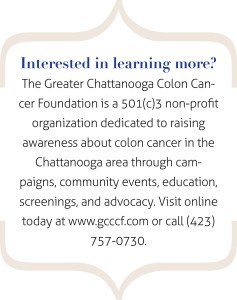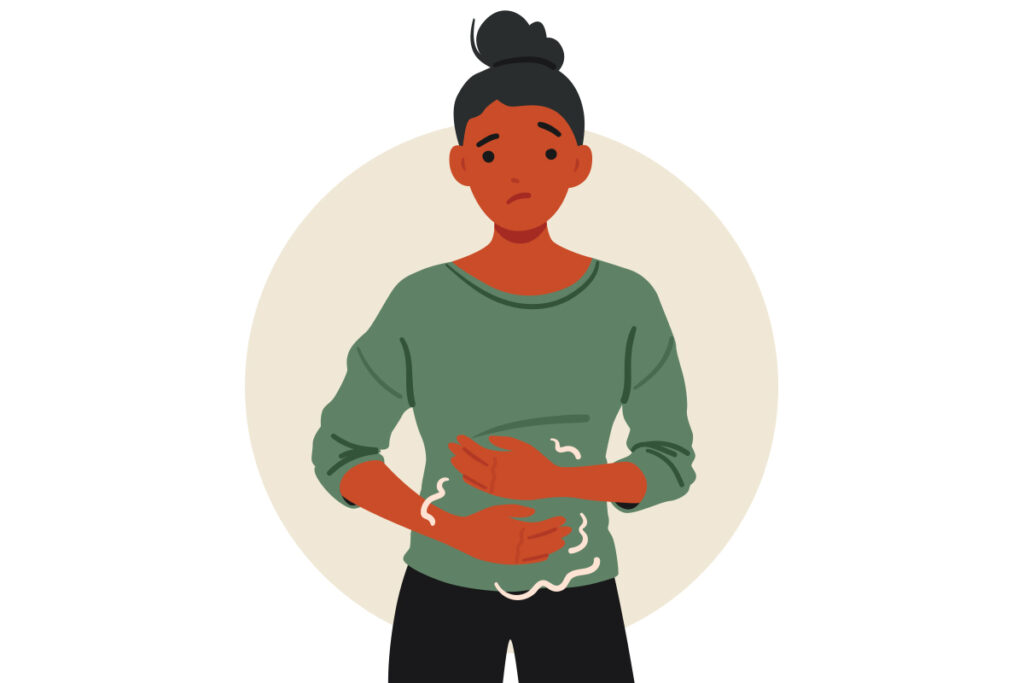With over 120,000 new cases of colon and rectal cancer projected by the American Cancer Society in 2014, colorectal cancer (the term for both colon and rectal cancer), is the third most common cancer diagnosed in the United States. Last year alone, 102,480 cases of colon cancer and 40,340 cases of rectal cancer were detected and diagnosed, with over 3,000 of those coming from the state of Tennessee. Along with being the third most common cancer in the U.S., colorectal cancer also counts as the third leading cause of cancer-related deaths in our country each year, according to the American Cancer Society. Colorectal cancer doesn’t have to be deadly though, and with early detection and improved treatment options, it’s increasingly survivable. Over 1 million colorectal cancer survivors are alive and well in the United States today.
By Candice Graham
Full PDF here.
A Body Without Cancer
If your colon is healthy, you might not have thought much about its function. As part of the digestive system, the colon works to absorb water and salt from ingested foods and then forms solid waste. Here’s how it works:
After food is swallowed, it makes its way through the esophagus to the stomach. There the food is partially broken down, and then sent to the small intestine.
The small intestine breaks the food down even more and absorbs its nutrients.
The remaining food matter travels through the large intestine, made up mostly of the colon. A muscular tube about 5 feet long, the colon absorbs water and salt from the matter.
After going through the colon, all that’s left of the food matter is waste. This moves into the rectum, where it is stored until it passes from the body in the form of fecal matter.
What is Colon Cancer?
According to the Mayo Clinic, colon cancer begins with small, noncancerous clumps of cells called polyps, found in the inner lining of the colon. Polyps usually develop slowly over many years (as many as 10 to 15), and while some develop into cancer, not all do. According to the American Cancer Society, the likelihood of cancer developing depends on the type of polyp – either adenomatous or hyperplastic and inflammatory. Adenomatous polyps are referred to as “pre-cancerous” polyps. Hyperplastic and inflammatory polyps generally aren’t cancerous, but they can become pre-cancerous. They can also signal the development of adenomatous polyps.
If a polyp develops into cancer, the cancerous cells can begin to grow into the wall of the colon. Once inside the wall, cells can grow into blood vessels or lymph vessels. Once this happens, the cancerous cells can multiply and spread to other parts of the body.

What to Look For – Signs and Symptoms
Many people with colon cancer experience no symptoms in the early stages of the disease. However, depending on the cancer’s size and location, patients might eventually develop some or all of the symptoms listed below. The National Cancer Institute lists the following signs and symptoms as indicators of colon cancer:
- a change in bowel habits
- blood (either bright red or very dark) in the stool
- diarrhea, constipation, or feeling that the bowel does not empty all the way
- stools that are narrower than usual
- frequent gas pains, bloating, fullness, and cramps
- weight loss for no known reason
- feeling very tired
- vomiting
While these symptoms could be a sign of colon cancer, they could also signal a number of other cancers or illnesses, which can be determined by your doctor.
When should I see a Doctor?
It’s time to see your doctor if you experience any of the symptoms listed above. Even if you have no symptoms, the Colon Cancer Alliance recommends that everyone 50 or older have regular screenings for colon cancer. Depending on other risk factors, your doctor may recommend more frequent or earlier screenings. Screenings can find polyps, which can be removed before cancer forms, or they can catch colon cancer early, increasing your chances of being cured. Come prepared with questions and a list of your symptoms when you sit down with your doctor.
Am I at Risk?
Risk factors for developing colon cancer can vary widely, and include both lifestyle factors and inherited circumstances. Being at risk doesn’t always mean you’ll develop colon cancer, and conversely, you can develop colon cancer without possessing any of the known risk factors. According to the Mayo Clinic, inherited factors and chronic conditions that can increase the risk of developing colon cancer include:
- a personal history of colorectal cancer or polyps
- family history of colon cancer and colon polyps
- inflammatory intestinal conditions
- certain inherited syndromes, such as Lynch syndrome
- diabetes

Age is another important risk factor. “Though colorectal cancer may occur at any age, more than 90% of the patients are over age 40, at which point the risk doubles every 10 years,” says Dr. Shauna Lorenzo-Rivero, a surgeon with University Surgical Associates specializing in general and colon and rectal surgery. “Other high risk factors include a family history of colorectal cancer and polyps and a personal history of ulcerative colitis (a form of inflammatory bowel disease), colon polyps, or cancer of other organs, especially of the breast or uterus.”
Other potential causes of colon cancer can be managed by making lifestyle changes. If any of these risk factors apply to you, you may want to talk to your doctor about your colon cancer risk:
1. low-fiber, high-fat diet
2. a sedentary lifestyle
3. obesity
4. smoking
5. heavy alcohol use
Diagnosis and Treatment
To diagnose colon cancer, a doctor first performs either a colonoscopy or a CT colonography. A colonoscopy uses a thin tube with an attached video camera to view the inside of the entire colon. Doctors can pass surgical tools through the tube to take tissue samples or remove any suspicious polyps. Polyps and/or tissue can then be sent to the lab to be checked for cancer.
“The procedure can be done in a hospital, a clinic, or a doctor’s office,” says Dr. Charles Portera, a surgical oncologist with Memorial Health Care System. “It usually takes about 30 minutes and the patient will be sedated. Full bowel preparation is needed and most people will need to miss a day of work to recover. Some downsides are that it can sometimes miss small polyps and there is a small risk of bleeding and/or bowel tears.”

Surgical Oncologist, Memorial Health Care
The second option, often preferred by patients who can’t have or don’t want to have the more invasive colonoscopy, is called CT colonography. This uses a CT scanner and special computer programs to create both two and three-dimensional images of the inside of the colon and rectum. “The test can be done fairly quickly and no sedation is necessary,” says Dr. Portera. “Full bowel preparation is still necessary, however, and a colonoscopy will be necessary if the findings are abnormal.”
If these tests find colon cancer, the next step is to determine its stage or immediately move forward with treatment. According to the Mayo Clinic, there are three primary treatment options for colon cancer. Those include surgery, chemotherapy, and radiation.
Surgery. The earliest stage of colon cancer (stage 0) can usually be cured at the time of the patient’s colonoscopy procedure via polyp removal (polypectomy). Stage 1 and most of stage 2 patients—in which the cancer is either limited to the colon or has extended through the wall but not spread to the lymph nodes—have an excellent chance of cure with surgery alone, with survival of over 90%.
“Today’s surgeons can often perform what’s called a laparoscopic colectomy, in which the surgeon makes several small openings in the abdomen and uses small cameras and special instruments,” says Dr. Daniel Marcadis, a gastroenterologist with Hamilton Medical Center. “The advantage is a quicker recovery and the avoidance of a single large incision.”
Chemotherapy. Chemotherapy, drugs used to destroy cancer cells and reduce risk of recurrence, is usually given if the cancer has spread to the lymph nodes. Dr. Marcadis says newer types of chemotherapy have fewer side effects than those of the past and now we also have better medications to treat the side effects directly. “Many treatment regimens contain multiple types of chemotherapy directed at different parts of the cancer cell’s life cycle for better effectiveness,” he explains.
Radiation. Radiation uses energy sources to kill cancer cells that might remain after surgery, to shrink tumors before an operation, or to relieve cancer symptoms. “Radiation plays an important role in the subgroup of patients with stage 2 and 3 rectal cancer,” says Dr. Marcadis. “It is given by a radiation oncologist 3-5 days a week for several weeks with few side effects.”

Gastroenterologist, Hamilton Medical Center
What Can I do? – Prevention and Regular Screenings
Whether you’re at high risk for colon cancer or possess none of the known risk factors, there are preventative steps that everyone should take. Simple lifestyle changes are recommended by the Mayo Clinic. They include:
1. eating a variety of fruits, vegetables and whole grains
2. drinking alcohol in moderation, if at all
3. exercising most days of the week
4. maintaining a healthy weight
5. quitting smoking
“Diets high in saturated fat like red meat are thought to slightly increase risk, whereas high fiber diets (fruits and vegetables) are protective,” says Dr. Lorenzo-Rivero. “Smoking not only increases the risk of lung cancer, but colon cancer, too.”
The best way to stay cancer-free is to begin scheduling regular screenings with your doctor. The American Cancer Society recommends that people who have no identified risk factors begin regular screening around age 50. Those who have a family history or other noted risks are encouraged to talk with their doctor about starting screening at a younger age and getting screened more often. According to the Colon Cancer Alliance, early detection is vital, as screening can help prevent 90% of all cases. With vigilance and extra precaution, colon cancer can not only be caught early and treated fast, but prevented before it ever starts.








